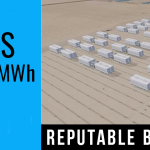
ENERGY Exploration Technologies (EnergyX) has developed a scalable lithium extraction process using metal organic framework (MOF) membranes to extract lithium from brines, which is a faster, more efficient, and more environmentally friendly method than conventional processes.
The technology is known as Lithium Ion Transport and Separation (LiTAS) and is the result of research from the University of Texas at Austin, Monash University, and the Commonwealth Scientific and Industrial Research Organisation (CSIRO) in Australia. EnergyX has secured the rights to the technology and is commercialising it.
LiTAS uses mixed matrix membranes (MMM), which are an interconnected network of MOFs held together by polymers. MOFs have large internal surface areas and small pore sizes, which makes them suitable for separation, and polymers have robust mechanical properties. The MMM is made into a thin film using a proprietary casting method created by Kevin Reimund, the Director of Membrane Engineering at EnergyX. The film is then rolled into a module and then thousands of modules can be linked together to create a scaled-up version at a lithium extraction facility.
Disruptive technology
Typically, lithium is produced from brine evaporation or hard rock mining. Producing lithium from brine evaporation takes an average of 18 months but can take up to 24 months. It also uses a significant amount of freshwater, requiring around 2,270 L/t of lithium produced. In contrast, EnergyX’s technology is a continuous process that takes one to two days and it doesn’t require any fresh water. The MOF also ensures that the lithium is separated from all other salts in the brine. LiTAS has a low power consumption, reduced operating costs, and has a lithium recovery rate of 90% compared to 30–50% from conventional processes,
According to Teague Egan, founder and CEO of EnergyX, the technology will be extremely disruptive to the industry. “It is an absolutely transformative step-change in the way lithium is sourced today. Traditional lithium mining is done through either hard rock or brine evaporation. We are looking to replace the brine evaporation side, which will drastically undercut the economics of hard rock mining as well. We are confident our new method will completely replace traditional mining. It’s a horse vs car comparison.”





